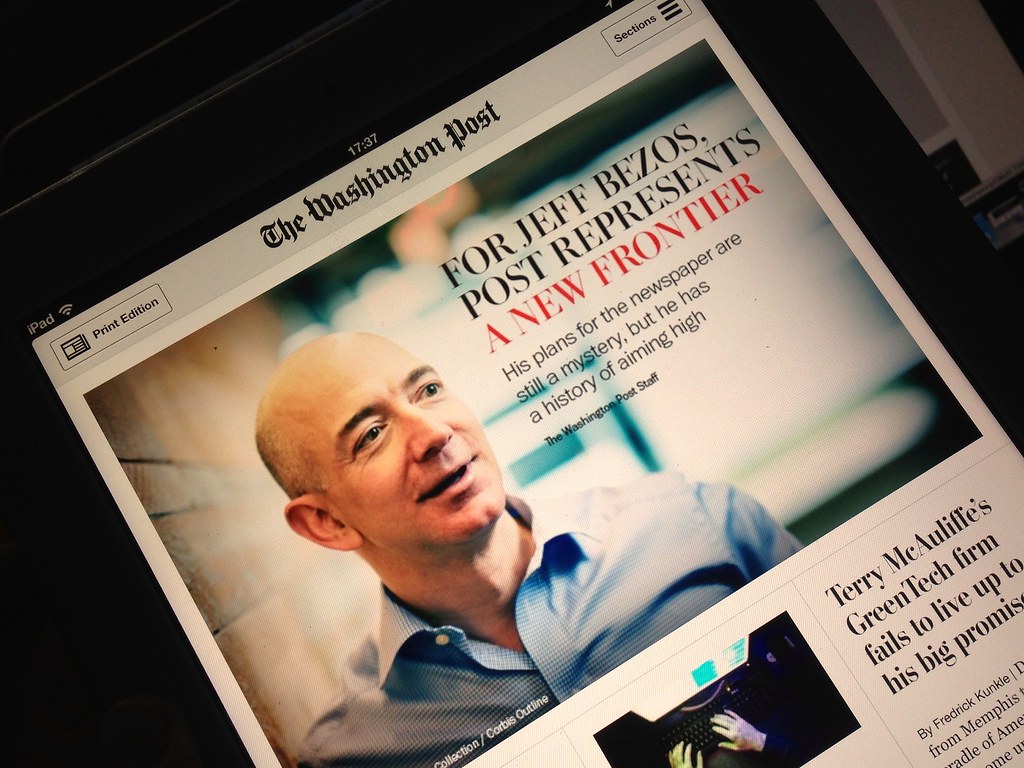The newspapers, the editors and the case of Bezos’ Washington Post

Can an English journalist affected by the scandal of stolen sources direct an American newspaper? The question arises not from some idle summer festival or yet another conference, but from the front page of the Washington Post, the newspaper of which Robert Winnett is expected to take over the editorship in a few months. Four journalists write about their newspaper as if they didn't work there: a lesson in ethics for the Italian press? Gregory Alegi's commentary
Il Fatto Quotidiano investigating the relations between its director and Russia? Impossible. Il Messaggero publishing an investigation into the reasons why the owner Caltagirone fired the director Alessandro Barbano? Unthinkable. Does Agi explain the reasons for the no-confidence vote in director Rita Lofano? We're not joking. In the United States, however, it happens that the Washington Post puts a long article on its front page on the involvement of the future director in the use of materials obtained illicitly when he worked in England. The question, unexpressed but very clear, is whether the British way of working is compatible with the ethics of American journalism.
The battle begins in November 2023 when the publisher of the Post – i.e. Jeff Bezos, the owner of Amazon – appoints CEO Will Lewis, a former English journalist who moved to managerial roles in Rupert Murdoch's News International group in 2010, in the midst of the crisis for the VIP wiretapping scandal that led to the closure of the News of the World tabloid. Bezos recruited him from Dow Jones, another Murdoch company, which among other things publishes the Wall Street Journal .
Within a few months, Lewis was in stark contrast to Sally Buzbee, the first woman to run the Post , recruited just two years earlier. At the center of the clash, a tangle of reasons, ranging from the editorial reorganization that would have confined it to social media and public utility journalism to the decision to publish an article on Lewis' involvement in the trial underway in London. Buzbee publishes anyway, and leaves the paper on June 2. The story is revealed three days later by the New York Times .
To Lewis, the resignation seems like an excellent opportunity to put another Englishman at the helm of the Post , Robert Winnett, deputy editor of the Daily Telegraph , whose conservative position is in open contrast with the liberal tradition of the Post . The intent is to modernize the Post , which after having grown a lot in the first years under Bezos is now experiencing a crisis in readership and turnover.
On June 15, from London, the Times published another scoop: "It is said that in Great Britain the editor and next of the editor of the Washington Post have used stolen data." Writing on the basis of interviews with Peter Koenig, Winnett's former colleague at the Sunday Times , published interviews with former private investigator John Ford and cross-referencing with published articles, the Times describes a journalistic environment in which it was common practice to get scoops by paying the sources and pretending to be others ( blagging , in English slang). “His ambition overrode his ethics,” Koenig says of Winnett to the New York Times , who at several points points out that the Sunday Times paid Ford “to obtain material surreptitiously,” although not illegal by any stretch of the imagination. Hence the thrust: “This would violate the ethical codes of the Post and most American media outlets.” In other words, investigative journalism is a good thing as long as it respects ethics.
And it is at this point that the Washington Post puts four journalists, including two Pulitzer Prize winners, and two researchers on the Winnett case. In his place, an Italian newspaper would probably have ignored the matter or would have published a scathing political-backward denial, along the lines of "they want to blow us up because they fear I'll side with Trump" or "find me the spy so I'll fire him". Working from London (it is not clear whether to avoid interference or because traces of the Lewis-Winnett style abound), the Post team instead produced an article of over 18,000 characters, even recovering the drafts of the secret thief's unfinished book. And, far from absolving the future management team, the Post confirms the accusations made by the Times , with which it has been in competition since the Watergate days. No one is asking the English to step back, but the new director's reputation is damaged before he even takes office.
It's too early to say how it will end. Looking at it from Italy, there are already three things that are surprising. The first is the commitment of journalists to go beyond what is already known, adding unpublished sources which in themselves make the article news – in short, no heated soup or summary of the competitor. The second is that there is no difference between the newspaper of the "pure publisher" and that of the publisher with other interests. Same rules, same quality standards, same respect for the reader. The third, perhaps the most important, is the way in which the Post talks about itself: in the third person, with the tools it applies to every other story. To write the article, the journalists sent their CEO “a list of detailed questions, including about the source of the information for the 2004 articles.” Through a Post spokesperson, the four write, "Lewis declined to respond." As if he wasn't their publisher, with the power to fire them, especially with the restructuring underway.
To paraphrase the Romans, "Lewis is my boss, but the truth is more."
This is a machine translation from Italian language of a post published on Start Magazine at the URL https://www.startmag.it/mondo/i-giornali-i-direttori-e-il-caso-del-washington-post-di-bezos/ on Mon, 17 Jun 2024 13:11:21 +0000.
